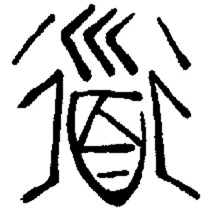The Dao of Dylan
essay
“How does it feel
How does it feel
To be on your own
With no direction home
Like a complete unknown
Like a rolling stone?”
~ Bob Dylan, “Like a Rolling Stone”
More than once in my life the above quote has served as a litmus test for my journey, a rite of passage, a moving through an empty gate.
On the heels of going through some hard times and facing the proverbial existential crisis, i would repeatedly ask myself the Dylan lyric. When one day the answer became: It feels alright! or perhaps even It feels good!, i knew i had passed the test, had made peace with whatever my life circumstances at the time had become, and, as if suddenly, felt content with my lot in life. A defining moment, especially considering that the lot seemed a little . . . but i could stare it all in the face, or the faceless, and say: i am no longer angry about what had happened or about what so-and-so did to me, no longer self-pitying or holding a grudge or whining about lack of friends or why doesn’t anyone give me the time of day or whatever the circumstances were at the time.
Similarly, one time driving through a maze of highway on/off ramps and wondering, What does it all mean? . . . a line from the Tao Te Ching (Thou Dei Jinn) came to mind . . . “The path is hidden and nameless.”
And suddenly the drive and my life didn’t seem overwhelming.
One of the things that the Tao/Dao reveals is how: feeling or being lost can actually be about being found.
While societally and in the age of gadget communications where many crave constant attention and feedback — lest their sense of self disappear— the Dao and Dylan’s lyrics are reminders that you will at some point, even if you have already, feel like “a complete unknown” . . . and if you can somehow embrace that, other doors will open . . . but they probably won’t be the ones you had been pining for so as to attain whatever personal status you thought you deserved.
Buddhist ways also encourage this embracing of so-called nothingness . . . which then opens up the gates and allows for deep appreciation of the everyday stuff — the mundane tasks as well as the ever-spectacular cyclic flow of seasons, sunrises, star-packed crystalline winter night skies, fill in the blanks of your local habit relationship with Mother Earth.
The original ideogram (above) for Tao shows a “moving sign (crossroads) enclosing a head” and the “<<<” above the head signify: “hair” and/or “three footprints” and/or “water/river.”
Alan Watts, in Tao: The Watercourse Way, sums this all up as: “to go ahead/rhythmic movement/intelligent motion.”
The combination conveys “rhythmic movement” along a Path with Mother Earth (as all paths must be) and “intelligent rhythm” along the Way of living peacefully.
Each day, each of us — individually and collectively — see signs and gateposts. How one processes that information and travels (both outwardly and inwardly) is a gist of the gift of the Dao/Tao (Thou). Each of us is a little thou, along the greater and mysterious Way or Path known as Thou.
The rhythmic movement accentuates “going and pausing,” paying attention to the crossroads/gateposts/signs . . . then making choices.
As the world (not to mention advertised internet speeds) moves ever-faster, pausing is sadly becoming an unsung hero.
In the film A Complete Unknown, the young Dylan is asked: “Can songs change things?” . . . to which he quippingly replies, “They change keys.”
This is another example of Dao or Zen in action, in other words, of not rat racing for praise, success, and countless “likes”, not being attached to the results of one’s actions rather simply doing what one is guided to do, what feels appropriate in the moment, what seemingly serves the well-being of all beings, then trusting in that. Let the world then decide what changed or what the result was. And whether that happens in a minute or a millennium is basically none of your business.
And just maybe some loner at the end of his/her/their rope will get your message or vibe, and suddenly feel known, even if simply through the eyes of a bird, the soft coat of a dog, or the flash of a smile from the human being in the thick of rush hour gridlock directing traffic.
Dao/Tao Te Ching (Thou Dei Jinn),
“The recognition of an ‘ideal’ of Beauty
requires ‘Ugliness’ to compare it with.
The ‘ideal of Goodness requires ‘Badness’ to compare it to.”
Dylan, from the song “Not Dark Yet”,
“Behind every beautiful thing there’s been some kind of pain.”
&
Dylan, in a 1986 interview,
”Listen, I’ve come through good times and bad times, you know, so I’m not fooled by a good times, bad times…”
Dao,
“…when one merely minds one’s own affairs,
rather than ‘taking care of the universe’
the universe may be entrusted to you…”
“You never turned around to see the frowns on the jugglers and the clowns
When they all come down and did tricks for you
You never understood that it ain’t no good
You shouldn’t let other people get your kicks for you”
“Bob Dylan - Like A Rolling Stone (Live at Newport 1965)”




That makes sense, Sabrina, though also the trees and birds are likely looking you over.
Good stuff. Lots of intriguing connections and crossroads.